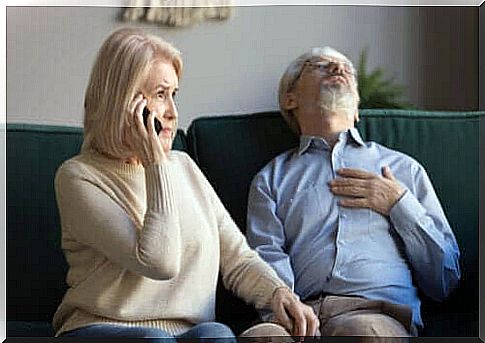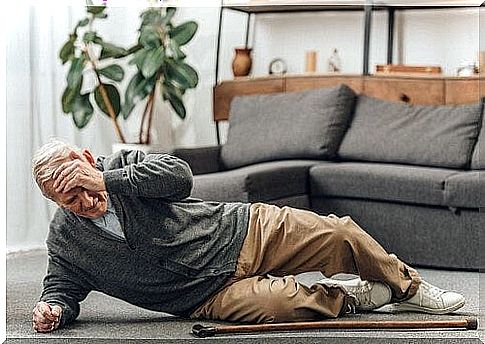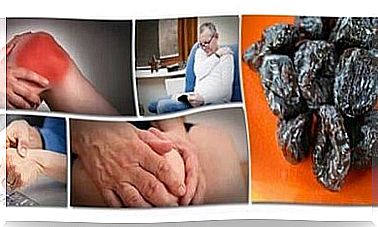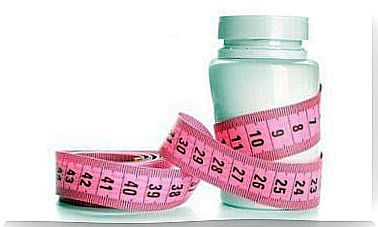First Aid In The Elderly And Common Accidents

Knowing some first aid maneuvers in the elderly is essential to be able to intervene in the event of an accident. In industrialized countries, life expectancy is very high, so much so that a large part of the population is between 70 and 80 years old.
As we age, we become more vulnerable to any injury. Precisely for this reason, a wound that does not represent a risk in young people can endanger the life of the elderly.
First aid in the elderly is of particular importance in the case of those people who care for an elderly person. In this article we explain how to act.
What accidents require first aid maneuvers in the elderly?
Older adults or older adults generally have mobility problems or are more vulnerable to any problems. The reason is that the incidence of comorbidities increases. We are talking, for example, of osteoporosis, arterial hypertension and dementia.
In addition to this, from a certain age, health conditions make it necessary to know some first aid maneuvers for the elderly. This category, in fact, is more prone to confusion, worries or problems with sight and hearing. This is why the intervention maneuvers are different from those suitable for young people.
According to a First Aid for Life article, most accidents in old age are falls. Nearly 75% report injuries to their limbs and back.
As a study published in Know What To Do states, falls are typically associated with vision loss or balance problems. Furthermore, it is important to point out that poor stability can be a consequence of taking medications.
Another condition to take into account in the case of the elderly is bleeding. Very often, anticoagulant drugs are given to treat cardiovascular diseases. In the event of an injury, the risk of bleeding increases.

Other common accidents
Cardiovascular disease is another factor to be aware of as an elderly person. For example, it increases the risk of suffering from heart attacks or strokes.
First aid in the elderly can also be aimed at treating the consequences of diabetes, drug poisoning or seizures. In addition, it is important to consider the risk of dehydration or extreme changes in temperature.
First aid interventions in the elderly as appropriate
Depending on the type of accident, a series of first aid maneuvers should be performed for the elderly rather than others.
You need to know how to act from case to case to limit the risk of complications. We present the most common situations in the following lines.
1. First aid maneuvers in the elderly in the event of a fall
The first thing to do to help the elderly immediately, regardless of the situation, is to ask for help. When a person falls, he must first be calm and moved carefully.
If the person reports severe pain, swelling, or inability to move, avoid moving the part.
If possible without causing pain, help the person to stand up. In these cases, the advice is to get her on all fours, in order to stabilize her. Then, he will have to lift his elbows off the ground.
In cases where the fall has caused loss of consciousness, bleeding or nausea, it is advisable to go to the emergency room immediately. The same is true if you have difficulty breathing or a suspected bone fracture.
2. How to behave in the event of a road accident
Traffic accidents are common. According to what is explained in some specialist first aid magazines, in the case of the elderly the PAS strategy must be followed : protect, warn and rescue.
The first thing to do, therefore, is to remove the person from the center of the road or protect him. We must call for help immediately. Once this is done, everything possible must be done to clear the airways and to stop any bleeding.
3. First aid in the elderly in case of intoxication
Intoxication in the elderly can arise from various causes. As at any age, it must be considered that it could be a suicide attempt. However, it should also be borne in mind that it could be a mistake in taking a drug.
In case of intoxication, the cause must be traced. Once identified, the ideal is to call the emergency room to know exactly how to behave.
Do not induce vomiting and do not offer the patient any liquid or medication. If the intoxication is due to inhalation of gases – such as carbon dioxide or paints – the person should be taken to a space with clean air.
4. Take action in case of suffocation
Choking can occur at any age. First aid in older adults is not all that different from that of other age groups. In the absence of respiratory problems, the person must be invited to cough and reassure him as much as possible.
In case of breathing difficulties, the first aid must be called and maneuvers to unblock the airways must be initiated.
We are talking about the so-called Heimlich maneuver . The attempt to extract the object or food with the hands or by beating the chest should be avoided.
First aid kit
To be able to carry out first aid maneuvers in the elderly it is essential to rely on a good kit to keep at home. The ideal would be to have one at home but it is even more important that an elderly person keep them at home. It should be able to count on a number of fundamental elements.
You should keep gauze, scissors, plasters and tweezers. Also, it’s important to keep tape, antiseptic napkins, and hand sanitizer. Even better is having ice packs to keep in the freezer and a thermometer on hand.
On the other hand, you should keep a number of basic generic drugs at home. For example, anti-inflammatory, analgesic, antipyretic and even antiseptic ointments. The dosage varies according to the health condition of the family.
For example, if the person in question is a diabetic on insulin therapy, they will need to be able to rely on an extra dosage. In addition, it is recommended to monitor blood pressure or an insulin meter.

We must act with determination and quickly
Knowing the basic first aid measures for the elderly prevents several complications and can even save lives. You need to be clear on how to act in any situation.
The ideal is that anyone caring for a person suffering from a disorder is aware of the risks that this person faces. Depending on the disease, he will be more prone to one problem than another.
This is why the advice for family members is to take an interest in the pathology of their loved ones and to investigate the real risks they face.
Acting quickly and decisively reduces the likelihood of the person suffering serious and irreversible injuries.









